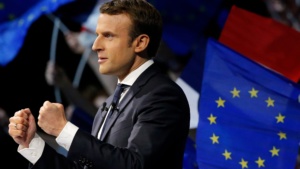French President Emmanuel Macron has announced a plan to curb migration across the Mediterranean after meeting African and European leaders.

It involves tackling people smugglers, improving stability in Libya and increasing aid to the transit countries.
Mr Macron also wants asylum requests handled in Libya, Chad and Niger.
Niger President Mahamadou Issoufou said people-smugglers had to be offered alternative means of making a living.
He said they destabilised his own country by bringing weapons back from Libya after guiding migrants across the desert.
Meanwhile Italy’s Prime Minister Paolo Gentiloni said he wanted migration flows to fall to a more manageable level and the cultural impact of mass migration on host countries to be reduced.
Italy has long urged its EU partners to help ease the burden of housing migrants, as its reception centres are overcrowded.
German Chancellor Angela Merkel said fighting people-traffickers had to go hand-in-hand with development.
“Without future prospects for the people of Africa we will not be able to manage the issue of illegal migration,” she said.
In 2015 the EU pledged €1.8bn (£1.6bn; $2.1bn) for initiatives to help African countries stem the flow of migrants to Europe.
The plans include beefing up border surveillance along migrant routes and schemes to create jobs for impoverished communities.
Nearly 100,000 migrants have made the perilous sea journey from Libya to Italy this year, and the UN’s International Organization for Migration (IOM) says more than 2,000 have died on that route.
In July the number crossing to Italy dropped by 57% compared with June – partly, officials say, because Italy has tightened co-operation with Libyan security forces.
However the BBC’s Hugh Schofield in Paris says Libya’s chronic instability would be a major obstacle to asylum processing “hotspots” operating there.
This summer Spain has seen a surge in migrants making the much shorter journey from Morocco.
Most of the migrants are West Africans, with Nigeria, Guinea and Ivory Coast the top countries of origin. In most cases they are treated as economic migrants, rather than refugees fleeing fighting or persecution.








